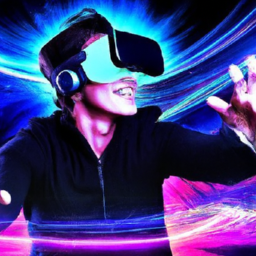The Future of Virtual Reality in Digital Marketing
Virtual Reality (VR) technology has come a long way in recent years, transforming the way we experience entertainment, gaming, education, and even healthcare. But have you ever stopped to think about the potential impact and benefits that VR can bring to the world of digital marketing? In this blog post, we will explore the exciting future of VR in digital marketing and discuss the potential it holds for businesses.
What is Virtual Reality?
Virtual Reality is an immersive technology that simulates a realistic artificial environment using computer-generated graphics or real-life recorded footage. It typically requires the use of a VR headset, which helps to create a sense of presence and allows users to interact with the virtual world.
Potential Impact of VR in Digital Marketing
Virtual Reality has the potential to revolutionize the way businesses engage with customers and market their products or services. Here are some of the key impacts that VR can have on digital marketing:
Enhanced User Experience
VR provides a highly immersive and interactive experience for users, enabling them to fully engage with a brand or product. With VR, businesses can create virtual showrooms, allowing customers to explore their products or services in a realistic and dynamic environment. This enhanced user experience can lead to increased customer satisfaction and brand loyalty.
Better Product Visualization
One of the challenges in digital marketing is helping customers visualize products accurately. VR can solve this problem by allowing users to virtually try out products before making a purchase. For example, a furniture retailer can create a VR experience where customers can see how different pieces of furniture would look in their home, helping them make more informed buying decisions.
Virtual Tours and Experiences
Tourism and hospitality businesses can leverage VR to provide virtual tours of their establishments. Hotels can offer potential guests the opportunity to experience their rooms, facilities, and amenities from the comfort of their own homes. This can be a powerful marketing tool to attract new customers and increase bookings.
Immersive Advertising Campaigns
VR can take advertising to a whole new level by creating immersive and memorable experiences. Brands can use VR to transport customers into a different world and allow them to interact with their products or services. This can help capture attention, generate buzz, and increase brand awareness.
Benefits of VR in Digital Marketing
Now that we’ve explored the potential impact of VR, let’s take a look at some of the key benefits it offers to businesses:
Increased Engagement and Interactivity
VR allows businesses to create interactive experiences that engage customers on a deeper level. By providing a more immersive and engaging environment, VR can capture and hold users’ attention for longer periods, increasing the likelihood of conversion and sales.
Effective Storytelling
With VR, businesses can tell compelling stories and evoke strong emotions in their audience. By placing customers in the center of a virtual world, brands can create powerful narratives that resonate with their target market and leave a lasting impression.
Data Analytics and Insights
Virtual Reality can provide valuable data and analytics to businesses. By tracking users’ interactions within the virtual environment, brands can gain insights into customer behavior, preferences, and reactions. This information can be used to optimize marketing strategies and improve the overall customer experience.
Competitive Advantage
Early adoption of VR in digital marketing can give businesses a competitive edge. By embracing this innovative technology, companies can differentiate themselves from their competitors and position themselves as industry leaders. This can attract new customers, strengthen brand reputation, and boost overall business growth.
In conclusion, the future of Virtual Reality in digital marketing is full of immense potential and exciting possibilities. VR has the power to transform how businesses engage with customers, improve product visualization, create immersive experiences, and ultimately drive growth. As VR technology continues to evolve and become more accessible, it’s essential for businesses to explore and embrace this new frontier in digital marketing.











